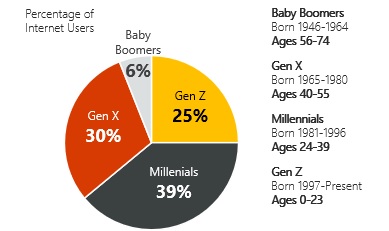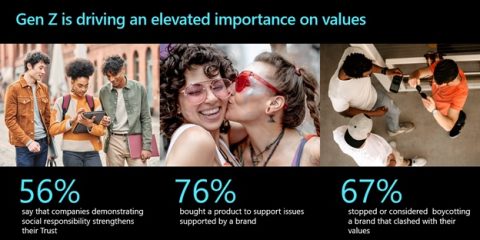As digital marketers, we spend a great deal of time focused on impressions, clicks, and conversion data. What campaign, ad, or landing page is converting today?
Yes, it’s about performance – but it’s also important to take a step back and recognize that factors like customer experience and brand trust also impact conversion rate.
We have a responsibility in marketing and advertising to consider more than just surface-level details; there is an ever-growing emphasis on inclusivity, trust, and connecting to consumer values.
In this column, you’ll learn the three key components in this values-to-trust discussion and actionable takeaways to help you build a values-led approach into your own organization.
Why Trust? Why Values?
Simply put, connecting brand values to consumer values builds trust. And as trust in a brand increases, so does each customer’s expression of love for the brand.
Reflecting inclusivity, trust, and connection to consumer values in a genuine and authentic way paves a path to consumers perceiving a brand as built for “someone just like them.”
There are three key components to this values-to-trust discussion:
- Generational values have started driving consumer engagement, brand loyalty, and consumer expectations. These generational values differ (with occasional overlap) between Gen Z, Millennials, Gen X, and Baby Boomers.
- Only 1/3 of advertisers think that taking a social or political stand strengthens their relationship with customers. And a little over half think it’s a gamble. The others have no opinion.
- 80% of people believe that brands should play a role in solving societal problems.
Generational Values Matter
Tailoring your brand’s message so that it resonates with different audiences is more important than ever.
Generational attitudes and values differ, and that’s important for you to keep in mind as a brand seeking to build relationships with these audiences.
If we take the internet population and seek to understand the breakout by generation, we can see that the majority of internet users are Millennials, followed next by Gen X, then Gen Z, then Baby Boomers.
If we look at the general US population by generation, we see a variance in the numbers as each generation comprises between 19-22%, with the remaining percentage being The Silent Generation (1928-1945) and the Greatest Generation (before 1928).
This immediately tells us that Gen X and Millennials over-index on internet usage versus Boomers and Gen Z.
Gen Z and Millennials both prioritize the values of knowledge and curiosity, while Gen X, Boomers, and Pre-Boomers all share family, honesty, authenticity, relationships, and working hard.
 Source 1: eMarketer 2019, Graph source: GlobalWebIndex, Internet Users, Global, Q1 2020
Source 1: eMarketer 2019, Graph source: GlobalWebIndex, Internet Users, Global, Q1 2020Furthermore, 67% of survey participants in Gen Z stopped or considered boycotting a brand that clashed with their values.
When you combine that with the 80% of participants that want brands to solve societal problems, we see evidence that consumers are willing to engage or disengage with a brand in response to their values.
Businesses need to take a stand and show what they stand for. It’s riskier today to do nothing or play it safe than it is to authentically present what your brand stands for in the world.
A study conducted by Salesforce found that Gen Z is driving elevated importance on values.
This proves that as our younger generations move into the workforce, they will only strengthen the already growing mindset shift towards values and the need for inclusivity and values-based-keywords to be part of any online advertising strategy.

What Comes Next?
As marketing competition increases online, the need to connect with your audience in authentic ways becomes more important.
According to eMarketer, “By 2023, digital is expected to comprise nearly two-thirds of ad spend. So while it is crucial to establish shared meaning and purpose with your customers, it’s especially important to do so in your digital channels.”
Brands need to consider how generational values contribute to a research/sales cycle and how your brand/company values align with that for consumers.
No audience will have 100% shared values, so it’s important to think about how to develop a marketing strategy that is authentically and attitudinally compatible with many.
Each generation has been positioned to surpass the one before it in purchasing power, and technology has helped grow this trend.
Gen X will be the last generation to live with any first-hand experience of what the world was like without the internet or smartphones, and Gen Z is the first to never know the world without our modern reliance on the web and mobile devices.
While it’s important to be aware of generational values in general, authenticity remains the common denominator across all demographics.
Applying Generational Values to Your Marketing Strategy
Here are some key actions to help ensure an authentic and values-led approach to your marketing strategy:
Assess your brand or business mission statement.
Make this public on your website. Take a step back to review your brand statement/mission statement and how it correlates brand value to consumer value and consumer truth.
Align messaging with intended audience.
If you’re going through the work of understanding your brand values and how it translates through the consumer journey, be sure to align your messaging in ad copy and landing page. Is it an authentic message match that aligns with your audience?
Lean into all demographics and audiences as part of your strategy.
How are you looking at segmenting your base and reapply to campaigns?
Use target and bid – throw all ages, genders, and learn from it before optimizing accordingly (exclude or bid).
Match demographic learnings with authentic ad copy that speaks to each generation’s priorities. Apply In-Market audiences.
Test Dynamic Search ads to capture values-led search queries.
Review Search Query Reports (SQR) regularly to identify values-driven search queries that have converted and are worth adding as new keywords.
Where does your marketing strategy have an opportunity to create overarching value propositions that resonate with all generations?
More Resources:
- Digital Advertising Is Not the Next Internet Bubble – Here’s Why
- How to Make Your Personalized or Targeted Advertising Less Creepy
- How to Advertise on Facebook: A Beginner’s Guide
Image Credits
Featured image: Microsoft Advertising. Used with permission.
All screenshots taken by author, May 2021





